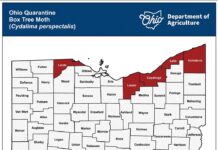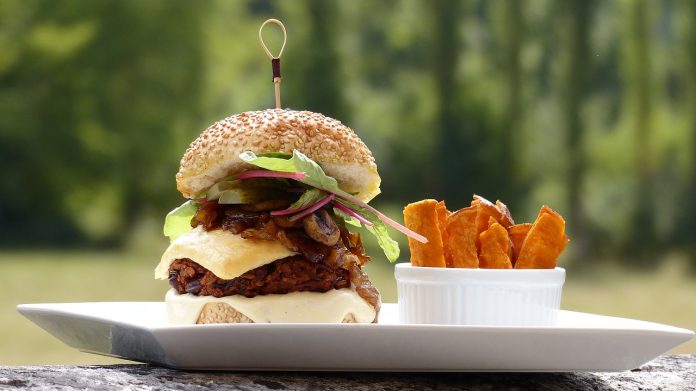P.T. Barnum, the quintessential American showman, might have found today’s food carnival more interesting and far more profitable than his namesake circus of yore. For example, slow food is taking note of the fast rise of meatless, or plant-based, burgers this year.
New burgers
Veggie burgers, their previous incarnation, are not new; the lovely Catherine has been buying and trying them for decades. This year, however, two companies, Beyond Meat and Impossible Foods, introduced high tech veggie versions of the American classic and both have rocked eaters and investors alike.
In her Sept. 2, Washington Post review of a Beyond Burger, food writer Alicia Kennedy, a long-time veggie burger devotee, noted that “… when it arrived and I took a bite, I immediately began to tear up … I was so sure I’d just eaten beef, for the first time in years.”
Joyous tears have also flooded Wall Street for Beyond Burger’s parent company, Beyond Meat. On May 2, the company offered its first public shares at $25 apiece. Prices that day closed at $65.75, then they really took off. On July 26, shares hit $235 before dropping back to “just” $165 on Sept. 3, a 660 percent rocket ride in just four months.
Farm reaction
Many farm groups (and most ag pundits, too) aren’t as impressed as fake meat’s eager eaters and gilded investors. All but a few scoff at the very idea of meatless meat tasting anything close to real meat while nervously confessing that they see vegetable-based meat as an existential threat to the livestock and poultry sectors.
That farm reaction was not unexpected. It is, after all, what we in U.S. ag often do: We condemn first, then — maybe, maybe not — ask for the facts. The fact is, meat alternatives snagged only $4.3 billion of the $900 billion-plus global meat market in 2018.
Mock meat sales
Market analysts see mock meat sales rising 6.8 percent per year through 2023, to an arguably unimpressive $6.3 billion, even as real meat sales grow faster.
Burger King is proving that forecast spot on. On Aug. 31, market watchers told Business Insider that Burger King’s recent 6 percent increase in sales rested on two, unforeseen facts: it’s meatless meat entree, called the Impossible Whopper (from Impossible Foods), is driving new customers to its 7,000 U.S. retail outlets and that, once there, “traditional beef Whoppers sales have also increased…” An even more plausible reality is that the biggest threat to meatless meat will come from other meatless meat newcomers attempting to catch their veggie lightening in a bun. More importantly, some of the newcomers aren’t new; they are the biggest of big boys in Big Ag.
“The big guns of ADM [Archer Daniels Midland], Cargill, Tyson and a host of others are elbowing for space, each keen for a serving of the latest and greatest in alternative meat fare,” noted Chris Bennett on agweb.com Aug. 13.
And, he added, “Innumerable smaller companies are jumping into the game, with new startups popping up monthly.”
Not endangered
Despite that rising investment surge in mock meat, farmers and ranchers — and chickens, beef cattle, lambs, goats, hogs, turkeys and anything else that sizzles when fried, roasted, grilled or boiled — are not an endangered species. In fact, veggie burger or not, the number of vegans and vegetarians in the U.S. has not increased in 20 years.
Moreover, Ethan Brown, the co-founder of Beyond Meat, told Vox in March “that 93 percent of consumers who buy Beyond Meat also buy animal meat—and he’s fine with that.”
Farmers and ranchers should be fine with that, too. Today’s global meat market is nearly $1 trillion strong and vegans, vegetarians and meatless meat lovers wouldn’t make a noticeable dent in it if all gathered weekly on the National Mall for a black bean burger binge.
Indeed, most only want one thing: healthy, nutritious, great-tasting food that’s not fake anything. The first one that consistently delivers what the customer wants wins. Just ask old P.T.














Not sure how these patties of nastiness are considered nutritious, healthy, or “not fake.” Look at the horrendously long ingredient lists filled with all kinds of fake/processed/chemicalized “stuff.” Thanks, but if I want something that tastes like beef, I’ll go to my freezer and eat just that from a 100% grass fed cow from my own farm. And I’ll sell it others too, who want true nutritious and “not fake” food. Ingredients: beef.
All well and good however, you mention “healthy and nutritious” in regards to these meatless burgers. They are neither and the science proves that if anyone bothers to look at it. Profits aside, I personally feel my health is worth a lot more than industry gain. These burgers are made with conventional soy and are contaminated with glyphosate (Roundup). Good ahead-check out the science-I did.
They also have other ingredients in them that I personally would not care to eat. The public has been fooled yet again into something claiming to be healthy that is NOT!
Ethan Brown has been vocal in disparaging Regenerative Farming practices and refuses to go visit any such farms (he has been invited) to actually see what they are about. He wins no points with me. He seems to be a bully with public platform!
I have nothing against a meatless burger. What bothers me is the cover-up of the conventional farming industry and their continued denial of glyphosates prevalence in people food not to mention the damage it’s doing to our health and the environment! But profits seem to be the main goal over health and I am but one voice. Do the research for yourself, please.
The author is completely ignorant of why people are infuriated with the ‘meatless Monday/vegan meat substitute movement’s. We could care less about what people want to eat-they could embrace fried frog turds and we could care less. It is the LIES about animal products being unhealthy and the LIES about plant based meat substitutes being healthy as well as the false naming of non-animal products (calling juice derived from plants ‘milk’ as well as plant based protein products ‘meat’ descriptions. However, the MAJOR problem traditional animal farmers have with this crap is KNOWING this movement has an underlying evil agenda-to CONTROL the population thru the control of food. The control of animal production takes the ability of people to raise their own food away from them and be dependent upon corporations to produce dietary nutrients….control food and control people. They are accomplishing this by brainwashing people into thinking it is cruel to slaughter animals and tricking people into thinking plant based foods are not cruel and are healthy. The Bible warns of food shortages-this is just one way the prophesies are being fulfilled.